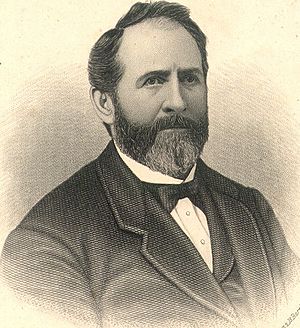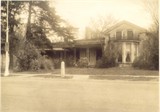Edwin Hurlbut facts for kids
Edwin Hurlbut (born October 10, 1817 – died November 28, 1905) was an American lawyer, writer, and politician. He was also known for his work helping others. A very important part of his life was helping to name the Republican Party in the United States.
Contents
Growing Up
Edwin Hurlbut was born in Newtown, Connecticut, in 1817. He was one of ten children. When he was seven, his family moved to Bradford County, Pennsylvania. They traveled in a covered wagon and lived in it while they built a log house.
Life was hard. Edwin walked four miles every day to school during the winter. The rest of the year, he helped his father clear land. They turned wild land into fields for crops. These early years taught him to be very determined. He never gave up on a task.
When he was fifteen, Edwin walked 100 miles to Newark, New Jersey, to visit his grandmother. He lived there for a year. Then he walked back to Pennsylvania and worked as a woodchopper.
Starting His Career
Later, Hurlbut left Pennsylvania and went to Eaton County, Michigan. He soon returned East to study law in Seneca County, New York. He opened his own law office there. In 1840, he married Catherine Chandler.
In 1842, he continued studying law with David Wilmot in Towanda, Pennsylvania. He became a lawyer in 1847. After losing his home, he moved his family to Mason, Ingham County, Michigan, in 1848. There, he worked as a lawyer and held other jobs. He was a Postmaster and a District Attorney.
In 1850, he planned to move to California. But he stopped in Wisconsin and visited Oconomowoc. He loved the place and decided to make it his home. He began working as a lawyer there. In 1854, his standing in the community allowed him to call for a meeting. At this meeting, he helped name the Republican Party in Madison, Wisconsin.
His Family Life
Edwin Hurlbut married Catherine Chandler in 1840. They had three daughters: Julia, Henrietta, and Kate. He worked hard to build a good life and support his family.
After Catherine died in 1864, he married Mary H. Farner in December of that year. His third marriage was in 1886 to Margaret Spearing. They had two daughters, Edwina and Margie. His younger daughters enjoyed the benefits of his hard work. People said he and his young wife, Margie, seemed very much in love. She helped him with his newspaper business. She even managed it after he passed away.
People described Hurlbut as a strong and independent man. He worked his way up in life. As a lawyer, he was considered one of the best in the state. He was known for his strong beliefs and his dedication to what he thought was right.
His Beliefs
Edwin Hurlbut was first a Baptist. He helped build a church for the Oconomowoc Baptist Society. It cost $5,000.00. A wind storm later destroyed it, and it was never rebuilt. He later joined the Episcopalian church.
He was also a high-ranking member of several groups. These included the Masons, the Knight Templar, and the Sons of Temperance.
His Political Journey
In 1832, Edwin Hurlbut campaigned with his father for Andrew Jackson. This was before political parties were divided over slavery. His work against slavery began when he worked for David Wilmot in Pennsylvania. Wilmot later became a U.S. Congressman.
In 1842, Hurlbut became a supporter of the "freesoil" cause. This meant he was against slavery spreading into new territories. He gave speeches and traveled to promote his ideas.
Here are some of his important political actions after moving to Wisconsin:
- 1850: He became a notary public.
- 1854: He called for a political meeting in Madison. At this meeting, he helped create a plan and named the new party "Republican."
- 1857 & 1859: He campaigned for his friend, Governor Alexander Randall.
- 1861: He became a Colonel on Governor Randall's staff. He actively recruited soldiers for the Union army during the American Civil War.
- 1869: He was elected to the Wisconsin State Assembly.
- 1870 & 1872: He was chosen to represent Wisconsin at international conferences about prisons and reforms.
- 1873: He was elected District Attorney for Waukesha County.
- 1874 & 1875: He became a trustee for the National Prison Association. He worked on committees for prison reform and helping former prisoners.
- 1875: He bought and edited the Wisconsin Free Press newspaper. He used it to promote his ideas until his death in 1905.
- He also held many local offices in Oconomowoc. He was the clerk of the school board for twelve years.
Hurlbut was a Democrat early in his life. But before the Republican Party started in 1854, he wrote a plan for the American Party. This party believed that only American-born citizens should hold political office. It also thought slavery should be a local issue.
The book Uncle Tom's Cabin (1852) and the Kansas–Nebraska Act (1854) made the country even more divided over slavery. An event in March 1854 pushed Hurlbut to name the Republican Party. Some citizens in Milwaukee freed Joshua Glover, a runaway slave. Federal officers had caught Glover, but the citizens helped him escape.
Hurlbut met with Sherman Booth, a newspaper editor, during this time. Hurlbut told Booth that it was the right time to unite people against slavery. He suggested they call a big meeting to start a new political party. Booth agreed and asked Hurlbut to write the call for the meeting.
Hurlbut believed a meeting in Madison in July could bring together anti-slavery feelings. He worked hard to promote the meeting. Sherman Booth printed the meeting notice in his newspaper for four weeks.
Hurlbut was the only person from Waukesha County at the Madison meeting. About 3,000 people attended. He was on the committee that wrote the party's goals. These goals were:
- No slavery in new territories.
- Against the fugitive slave law.
- Slavery should stay where it already existed.
Everyone at the meeting agreed to these goals. When it was time to choose a name for the new party, Hurlbut spoke up. He suggested the name "Republican." He said it was the name of Thomas Jefferson's party, which stood for true American values. The crowd cheered, and the new party was named the Republican Party by everyone's vote.
Hurlbut was a delegate to the first national Republican convention in 1856. They chose John C. Frémont for president. Hurlbut continued to support the party he helped create. However, in 1872, he left the Republican Party. He supported Horace Greeley because he disagreed with President Ulysses S. Grant's policies. He then worked with the Democratic Party until 1890. After that, he returned to the Republican Party. He continued to work for prison reform and prohibition.
Who Named the Republican Party?
Before the 1800s, only a few people spoke out against slavery. But in the early 1800s, more and more people, including preachers, spoke against it. By the 1840s, anti-slavery groups like the Liberty Party and Free Soil Party had formed. Edwin Hurlbut's experience in Wilmot's office in 1842 was part of this growing movement.
The Wilmot Proviso in 1846 and the Fugitive Slave Act of 1850 made the slavery issue even more intense. Uncle Tom's Cabin (1852) and the Kansas–Nebraska Act (1854) also fueled the anger against slavery. Before the Joshua Glover case, which made Hurlbut call for the Madison convention, other runaway slaves had been rescued. These events showed that the time was right for a strong political party against slavery.
The name "Republican" had been used by anti-slavery groups for years. Some people, like Horace Greeley, used the term as early as 1852. Other places like Crawfordsville, Iowa, Ripon, Wisconsin, Exeter, New Hampshire, and Jackson, Michigan, also claim to have named the party in 1854.
However, research by Mrs. Page Johnson in 1976 and R.F. Howard in 1903 agrees. They say Edwin Hurlbut named the Republican Party in Madison, Wisconsin, on July 13, 1854. A photo from a 1976 parade in Oconomowoc shows a sign saying, "Hurlbut Named Party Republican."
Later, Alvan E. Bovay also claimed to have named the party in Ripon, Wisconsin. He is recognized for this at the Little White Schoolhouse in Ripon. Hurlbut said that his meeting with Sherman Booth and their call for a convention happened without knowing about the Ripon meeting.
Hurlbut explained that the Ripon meeting was small. He said it was "a little knot of 'nickers'" and didn't lead to much. He also said the Ripon meeting was not a Republican meeting. It was a gathering of abolitionists who wanted to end slavery completely. They did not choose a party name at that meeting.
Hurlbut believed that the Madison convention was much more important. He said it was a "people's mass convention." Three thousand delegates voted on the capital building steps in Madison. They voted on Hurlbut's proposed name, "Republican." These delegates came from different old parties. This event made the state Capital Square the birthplace of the party.
Many small groups might have used the name "Republican." But it took a well-known person to call for a statewide convention. It also took hard work to present the name "Republican" to the people. This was Edwin Hurlbut's effort. His work led to the platform and the naming of the Republican Party on July 13, 1854, in Madison, Wisconsin.
Death
Edwin Hurlbut died on November 28, 1905. He passed away at his home in Oconomowoc, Wisconsin. He had been in poor health.
 | Madam C. J. Walker |
 | Janet Emerson Bashen |
 | Annie Turnbo Malone |
 | Maggie L. Walker |



